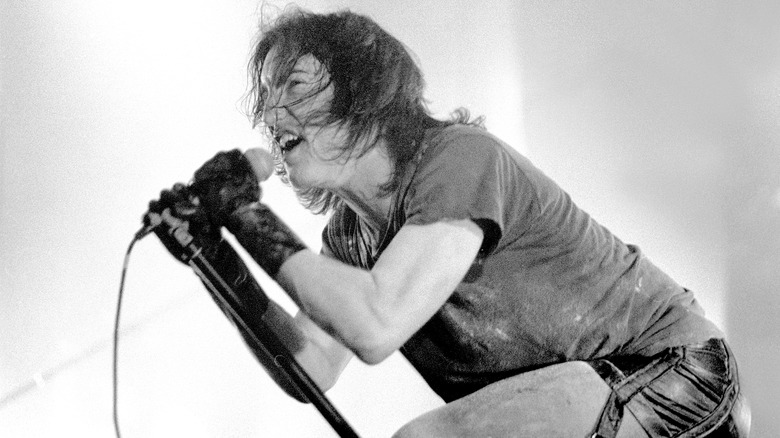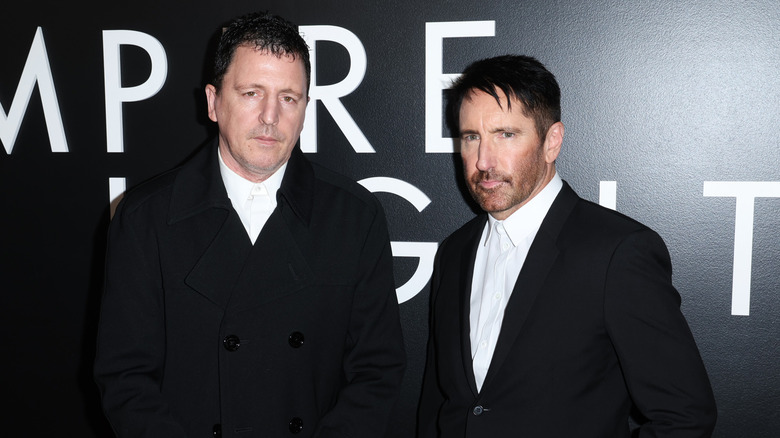Nine Inch Nails: The History Behind Head Like A Hole
"Head like a hole / Black as your soul / I'd rather die than give you control." While those lyrics won't exactly win any poetic points for subtlety or subtextual depth, they did help spur Nine Inch Nails into the greater pop cultural limelight in 1989. And yes, that song came out in the '80s on NIN's debut album "Pretty Hate Machine." By the time Trent Reznor and company released 1994's "The Downward Spiral" — a colossal step-up in terms of production quality and musical complexity — NIN had all but cemented its place in musical memory. Take the '80s underground industrial scene, add two parts grimy goth aesthetic, sculpt it into a radio-friendly rock structure, give it some notable music videos at the height of MTV's power, glue it together with a sweaty and hunched angst-lord, and you've got yourself a winner.
To be fair, Louder tells a more nuanced tale from Reznor's early days, one of a young man full of all the things that came out in his music: frustration, urgency, and intensity. Reznor was driven to radically change his life while doing odd jobs at Right Track Studios in Cleveland, Ohio. By 1989 — the year of "Pretty Hate Machine's" release, when Reznor was 23 or 24 years old — he'd gone over "Pretty Hate Machine's" songs again and again in a "meticulous and agonizing process." But "Head Like a Hole"? He wrote it as an afterthought, in "15 minutes in my bedroom."
Absolute creative control
As AllMusic says, Trent Reznor had been steeped in music his entire life leading up to "Pretty Hate Machine." He went from playing the piano at age 5 to playing the saxophone and tuba in his school's bands. He performed in musicals, got into rock music (particularly KISS), and attended Allegheny College for a year before leaving to make it in the music industry. He bounced between a few bands while working at a keyboard store and eventually got work at Right Track Studios. Here, he had the opportunity to get elbows-deep in music equipment and software while working elbows-deep as the studio's janitor. Eventually, he gained after-hours access to use Right Track Studio's equipment to record his own work.
As Louder continues, Reznor was a musical perfectionist. He'd hired band members to work with, but they just got in the way. In a 1990 interview with Propaganda (per Louder), Reznor said, "Collaboration leads to compromise, which can only water down the impact. What would a Van Gogh be worth, artistically, if he had other artists dabbing their paint brushes on his canvas?" Those words echo the "I'd rather die than give you control" lyrics Reznor wrote for "Head Like a Hole" last-minute to fit "Pretty Hate Machine's" tracklist. As a result, Reznor learned another critical lesson: "I realized the strength of this material was its emotional intensity," he told Propaganda. "It was emotion-based, rather than technique-based."
Ongoing value and meaning
As Trent Reznor told VidMag Media in 1990, the strength of 1989's "Pretty Hate Machine" — and "Head Like a Hole" by extension — is how small and personal it feels, like a window into when Reznor wrote it. "I just wrote about what was bothering me and what was in my head," he said. "The 'I' in the songs is me." Earlier in that interview he says that he simply finished his demo, sent it out to record labels, and that was that.
The small, personal origins of "Head Like a Hole" resonated with more people than Reznor might have expected, and in the song's specificity people find universality. And now, over 30 years later, folks not only still find common meaning in the song, but musicians like Miley Cyrus, of all people, covered it on "Black Mirror." No doubt the fast, spontaneous, unconsidered nature of the track's composition helped give it the driving, pumping feeling that superseded Reznor's more meticulous inclinations and matched his songwriting intentions better than he realized.
At this point in his career, Trent Reznor — along with longtime collaborator Atticus Ross — have gone on to become successful composers within Hollywood, scoring a 2011 Oscar for "The Social Network," another one for Pixar's "Soul," and even scoring "Teenage Mutant Ninja Turtles: Mutant Mayhem." It's a far cry from Reznor's early snarling days, but such is how things go when one refuses to give up control.


